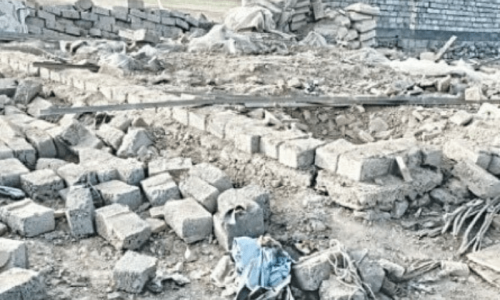PESHAWAR: A new team of professionals is facing a daunting task of replacing the rotten health care system at the teaching hospitals with a new one, especially at the Lady Reading Hospital where the patient care network has deteriorated over the years.
The Health Reforms Law 2015 is being implemented at the four tertiary care teaching hospitals, including the LRH, Khyber Teaching Hospital and Hayatabad Medical Complex, Peshawar, and Ayub Teaching Complex, Abbottabad.
For each hospital, a 10-mmeber Board of Governors (BoG) has been formed to oversee enforcement of the new law.
“We admit that the task to bring drastic reforms in the teaching hospitals is difficult, but it is not impossible. The people will feel a marked difference in the quality of health care within one year,” Dr Tahir Shah, member of the BoG at the LRH, told Dawn.
Dr Shah, a general surgeon who hails from Charsadda and graduated from Ayub Medical College, Abbottabad, in the 80s, is currently working as consultant surgeon in Saudi Arabia and had also worked in LRH in the 1990s. He says that the BoG members are confident about bringing the desired improvement in health care system.
Dr Shah paid his own travel expenses and flew all the way from Saudi Arabia to attend the BoG’s introductory meeting. “We are in the transitional phase from the ‘old to new’ system. Pakistani doctors have proved their competence throughout the world and there is no chance of our failure,” he said.
“Every effort revolves around one objective i.e. improve the patient care,” he says.
The government has advertised the posts of medical and hospital directors, who would run the institutions under the relevant BoG’s guidance. The BoGs will evaluate and oversee hospitals’ performance and ensure that patients benefit, he said.
He said that the board was taking certain measures to make the LRH, the province’s biggest and oldest teaching institution, a model hospital for the whole country.
“Attitude, knowledge and skills of the employees are being assessed. The new system offers incentives, protection and opportunities to the staff to improve their techniques and qualification,” he said.
He acknowledged that there were some problems like shortage of nurses, doctors and support staff, noting that one nurse worked at a place where four were needed and two doctors against the required strength of six.
“After an assessment, the human resources will be redistributed,” he said.
The board members are also Replacing rotten health care system a daunting task looking into the shortage of beds in orthopaedic, paediatrics and other specialties and the reasons why the eye and other units are not established despite the government’s approval years ago.
A joint meeting of the BoG members of the four hospitals on May 14 had discussed coordination and objectives of the new system in detail.
Dr Shah, a qualified director trauma from the American Society of General Surgeons, has submitted a 6-page report to the BoG regarding the Accident and Emergency Department (A&ED) of the LRH, noting that the department received a bulk of the victims from emergencies.
“We have planned to carry out a study about the survivors of violent attacks who were treated here and what were they doing,” he said. It will give us an idea about quality of critical care at the A&ED.
Dr Shah said they had begun work on launching Advanced Trauma Life Support courses to enable the intensive care staff and doctors to cope with traumas. The College of Physicians and Surgeons Pakistan will be approached to start a postgraduate degree programme in trauma that will strengthen emergency services across the province. The courses enable the doctors to identify injuries immediately and give prompt treatment to save the lives of the seriously-ill people.
“We have held meetings with consultants in orthopaedic, neurosurgery, cardiothoracic, medical and other wards, who have furnished their suggestions to improve emergency care,” he said.
“We have concluded that 80 per cent of the cold patients visit the A&ED that is supposed to provide fast track care to the acutely-ill or injured persons,” he said, adding that such a trend would be discouraged through an awareness campaign by advising that cold patients should visit the outpatients department (OPD).
The LRH is also starting the evening OPD, he said, adding that the government would also strengthen the primary health facilities so the patients could be treated locally.
Published in Dawn, May 22nd, 2015
On a mobile phone? Get the Dawn Mobile App: Apple Store | Google Play












































